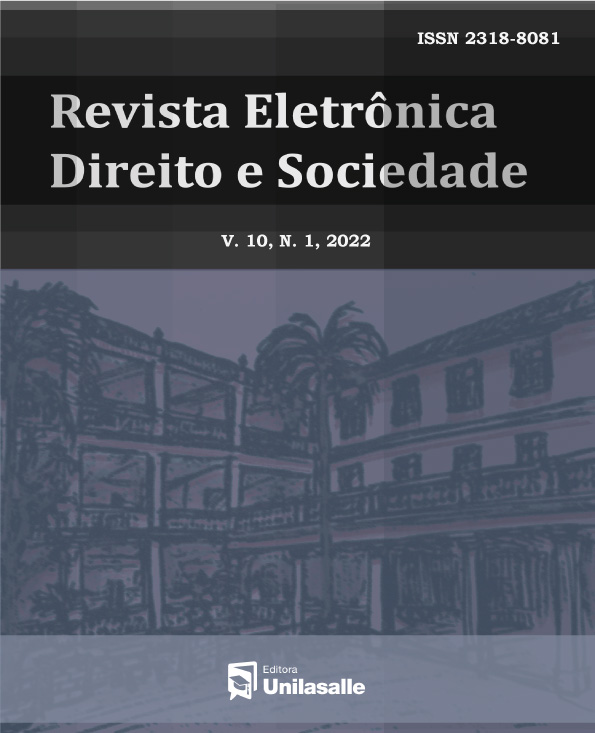Superendividamento da pessoa natural no Brasil: desafios conceituais e perspectivas de enfrentamento
DOI:
https://doi.org/10.18316/redes.v10i1.7959Keywords:
Superendividamento, Conceito, Desafios, Tratamento legal, Perspectivas.Abstract
Em um cenário de crescente crise econômica, ganha relevo a discussão acerca do superendividamento da pessoa natural. É preciso, porém, que tenhamos critérios seguros para enquadrar as situações jurídicas nesse fenômeno, com a adoção de parâmetros objetivos. Identificadas as situações, é igualmente fundamental investigar, mediante pesquisa bibliográfica com método indutivo, o tratamento legal dado à figura do superendividamento na atualidade, que se mostra deficitária e preocupante, ampliando a necessidade pela busca de soluções imediatas, sem descurar das perspectivas legislativas.References
ALVES, Leonardo Barreto Moreira. A Teoria do umbral do acesso ao Direito Civil como complemento à teoria do Estatuto Jurídico do Patrimônio Mínimo. Disponível em: <https://www.ibdfam.org.br/artigos/326/A+Teoria+do+umbral+do+acesso+ao+Direito+Civil+como+complemento+%C3%A0+teoria+do+Estatuto+Jur%C3%ADdico+do+Patrim%C3%B4nio+M%C3%ADnimo>. Acesso em: 8 set. 2020.
BUCAR, Daniel. Superendividamento e reabilitação patrimonial da pessoa humana. Editora Saraiva. Edição do Kindle.
BUCAR, Daniel. Quando a farinha é pouca: Pandemia, endividamento patrimonial crítico e pessoa humana. Disponível em: <https://www.migalhas.com.br/coluna/migalhas-contratuais/326000/quando-a-farinha-e-pouca-pandemia-endividamento-patrimonial-critico-e-pess%E2%80%A6>. Acesso em: 25 ago. 2020.
CASADO, Marcio Mello. Os princípios fundamentais como ponto de partida para uma primeira análise do sobreendividamento no Brasil. Revista de Direito do Consumidor, n. 33, São Paulo: Revista dos Tribunais, jan./mar. 2000.
COELHO, Fábio Ulhoa. Direito de Empresa. São Paulo: Saraiva, 26. ed., 2014.
FACHIN, Luiz Edson. Estatuto jurídico do patrimônio mínimo. Rio de Janeiro: Renovar, 2001.
GAGLIANO, Pablo Stolze; PAMPLONA FILHO, Rodolfo. Novo Curso de Direito Civil. Parte Geral. São Paulo: Saraiva, 11. ed., 2009.
LIMA, Clarissa Costa de. O Tratamento do Superendividamento e o Direito De Recomeçar dos Consumidores. São Paulo: Revista dos Tribunais, 2013.
LÔBO, Paulo Luiz Netto. Constitucionalização do Direito Civil. In Revista de Informação Legislativa. Brasília a. 36, n. 141, jan./mar. 1999.
LÔBO, Paulo Luiz Netto. Metodologia do Direito Civil Constitucional. In A Ressignificação da função dos institutos fundamentais do direito civil contemporâneo e suas consequências. PIANOVSKY, Carlos Eduardo et al. (Org.). Florianópolis: Conceito Editorial, 2014.
LÔBO, Paulo Luiz Netto. Direito Civil. V.2. Obrigações. São Paulo: Saraiva, 6. ed., 2018.
MARQUES, Claudia Lima. Sugestões para uma Lei sobre o Tratamento do superendividamento de pessoas físicas em contratos de crédito ao consumo. Revista de Direito do Consumidor n.º 55. São Paulo: Revista dos Tribunais, 2005.
MARTINS-COSTA, Judith. O Direito Privado como um “sistema em construção”: As cláusulas gerais no Projeto do Código Civil brasileiro. Revista de Informação Legislativa: Brasília a. 35 n. 139 jul./set. 1998.
MELLO, Marcos Bernardes de. Teoria do Fato Jurídico: Plano da Eficácia. São Paulo: Saraiva, 10. ed., 2015.
MORAES, Maria Celina Bodin. A Constitucionalização do direito civil e seus efeitos sobre a responsabilidade civil. In Revista de Direito, Estado e Sociedade. V. 9, n. 9, p. 233 a 258, jul./dez. 2006.
PELLEGRINO, Fabiana Andrea de Almeida Oliveira. Tutela Jurídica do Superendividamento. Salvador: Juspodivm, 2. ed., 2016.
PEREIRA, Caio Mário da Silva. Instituições de Direito Civil. Vol. I. Rio de Janeiro: Forense, 21. ed., 2006.
SAMPAIO, Patrícia Regina Pinheiro; NOGUEIRA, Rafaela; SILVA, Gabriela Borges. Superendividamento e insolvência civil no Brasil: oportunidade de reforma no marco regulatório. Revista de Direito do Consumidor, Vol. 118/2018, p. 293-329, Jul.-Ago. 2018.
TEPEDINO, Gustavo. Marchas e contramarchas da constitucionalização do direito civil: a interpretação do direito privado à luz da constituição da república. In (Syn)Thesis, Rio de Janeiro, vol. 5, nº 1, 2012.
Downloads
Published
Issue
Section
License
Authors who submit their manuscripts for publication in the “REDES” Magazine agree to the following terms:
The authors claim to be aware that they retain copyright by giving “REDES” the right to publish.
The authors declare to be aware that the work submitted will be licensed under the Creative Commons Non-Commercial Attribution License which allows article sharing with acknowledgment of authorship and publication in this journal.
The authors declare to be aware that by virtue of the articles published in this journal have free public access.
The authors declare, under the penalty of the law, that the text is unpublished and original and that they are aware that plagiarism has been identified, plagiarized authors will be informed - willingly, to take legal action in the civil and criminal sphere - and, plagiarists will have their access to the magazine blocked.
The authors state that - in case of co-authoring - all contributed significantly to the research.
Authors are obliged to provide retractions and (or) corrections of errors in case of detection.
The authors are obliged not to publish the text submitted to “REDES” in another electronic journal (or not).
The Electronic Journal Law and Society - REDES - is licensed under a Creative Commons License. Attribution-NonCommercial 4.0 International.Based on work available at "http://revistas.unilasalle.edu.br/index.php/redes/about/submissions#copyrightNotice".
Permissions in addition to those granted under this license may be available at http://creativecommons.org/.

